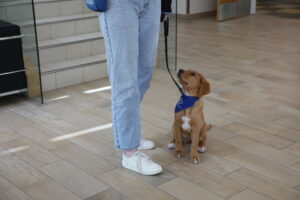By Mary Peter
It’s a pretty good lesson in life to avoid judging anything based only on what you may have seen or heard. That’s why some of the common misconceptions about service dogs and the veterans they serve is worth discussing.
For those who are blind and need a guide dog, a “seeing eye” dog, the breeds most often accompanying them are Labradors, German Shepherds or Golden Retrievers. And while certain breeds are more commonly chosen than others, many of us, including dog owners as well, mistakenly believe that those are the only breeds that could possibly be true service dogs.
As a Certified Master Dog Trainer (CMDT) with 30-plus years of training nearly all breeds for both family pets and professional investigations (scent detection work with federal & state law enforcement agencies), I assure you that there are a great many breeds that are capable of being trained as service dogs.
For veterans struggling with Post-Traumatic Stress Disorder (PTSD), Traumatic Brain Injury (TBI) or Military Sexual Trauma (MST), it’s all about the nose. The innate ability of some canines across all breeds to alert to the scent of adrenaline/cortisol and take action for their veteran is not found in most dogs. But trust me when I tell you we find it in all shapes and sizes, even in mutts.
With that skill and proper training we’re able to match veterans with their K9 partners and together they develop an extraordinary bond. Our veterans could be accompanied by Labradors and Border Collies, Terriers, Cocker Spaniels, Beagles, Schnauzers. Sadly, when the dog is a small breed, our veterans often hear ignorant remarks, like, “That doesn’t look like a service dog,” and “What can that dog possibly do for you?”
And yet, a dog as small as a Chihuahua or Yorkie is more than capable of taking action to get their veteran out of a nightmare or flashback and redirect their attention to the present.
“You look like you’re okay, what do you need a service dog for?”
Think twice. Much of the public are not only mistaken about canine characteristics and capabilities they are often mistaken about veterans as well. Some have the audacity to judge a veteran only by his or her appearance, uttering the question above.
Sadly, such intrusive and thoughtless remarks are made with alarming frequency, especially to younger veterans who may not use prosthetic devices or appear to have severe physical injuries. Comments such as these only add to the anxiety, stress, and frustration of veterans struggling with PTSD and other disorders whose scars are not visible.
It is a cruelty to these veterans when they are asked to justify themselves and their need for a service dog, as if their military experience does not measure up to those with noticeable injury.
Let’s be better. Let’s stand up for veterans and their service dogs.
_______________________
EDITOR’S NOTE: Mary Peter is the founder and executive director of training operations of K9 Partners for Patriots, a nonprofit dedicated to veteran suicide prevention, based in Brooksville, Florida.